Redditor Asks If They Are Wrong For "Stealing" All Of Their Neighbors' Birds
A Redditor decided to get a few bird feeders and fill them with delicious seeds to attract some of the neighborhood birds. She hung the bird feeders around her yard, and soon enough, the birds came flocking in.
OP was amazed at the variety of birds that she saw in her backyard. She watched in delight as the birds hopped from branch to branch and perched on the feeders to eat the seeds.
As the weeks went on, more and more birds began to visit the yard. OP was pleased to see that her efforts had attracted so many birds, and she continued to fill the feeders with different types of seeds to accommodate all of the various birds.
The birds have now made OP's backyard their home, and she enjoys watching them every day. It's a beautiful sight to see the birds singing and playing in her yard, and she is delighted to know that she has provided them with a safe and comfortable place to stay.
However, her neighbors don't find the situation adorable, and they have started complaining about how she has stolen their birds.
OP says: "People in my neighborhood have knocked on my door complaining about me being a ‘cuss word’ and stealing the birds."
Now they ask if what they did was wrong. Read the full story below:
OP asks:

They moved to a new neighborhood and set up a dozen bird feeders and some wildflowers

Here is the list:
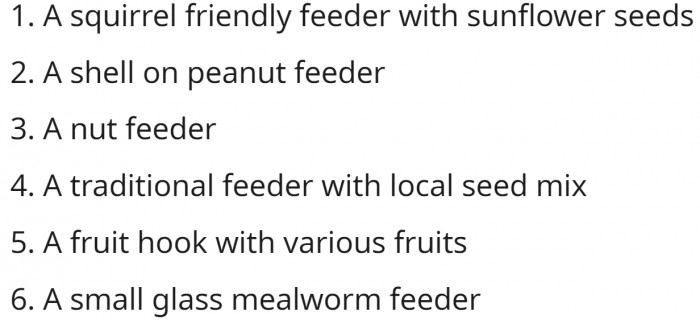
Understanding the Psychological Impact of Nature
Research has shown that engaging with nature can significantly enhance psychological well-being. Studies from the University of Michigan indicate that exposure to natural environments can reduce stress and anxiety levels while improving mood. This phenomenon, often referred to as 'nature therapy,' highlights how activities like setting up bird feeders can foster a sense of purpose and connectivity to the environment.
Additionally, the act of creating a sanctuary for birds and other wildlife can fulfill intrinsic human needs for nurturing and caretaking, thereby enhancing one's sense of identity and belonging.
Quite a buffet:
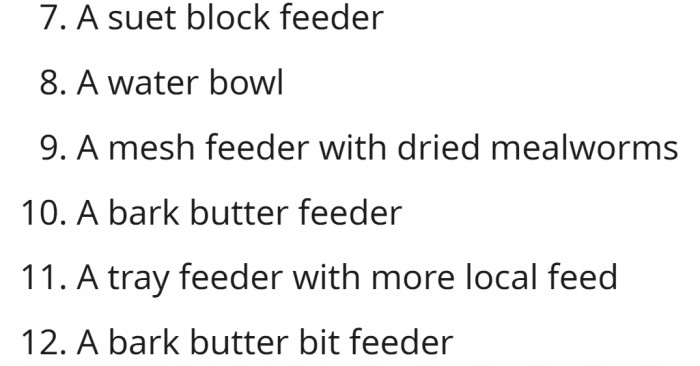
OP loves the fact that so many birds chose her yard

However, their neighbors don't.

In this situation, the feelings of guilt or conflict regarding "stealing" the neighbors' birds may stem from a complex interplay of social norms and personal values. Social psychology research shows that the concept of ownership and territoriality can significantly affect interpersonal relationships. When individuals feel that their actions might infringe on others' rights or expectations, it can lead to feelings of anxiety and guilt, creating cognitive dissonance.
Understanding this dynamic is crucial for navigating such situations thoughtfully and empathetically, promoting healthier interactions with neighbors and communities.
OP has offered the following explanation for why they think they might be the asshole:

The funniest complaint
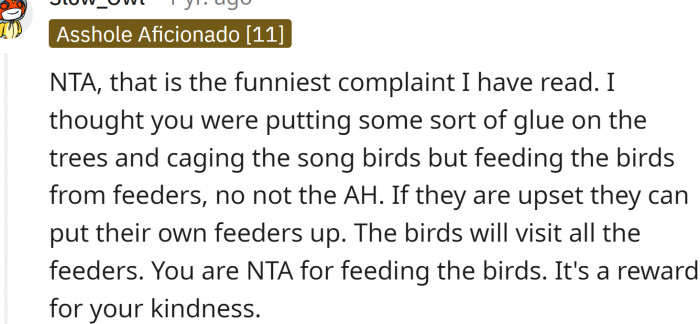
OP says:

The Role of Community in Wildlife Conservation
The act of attracting birds to one’s yard can also be seen through the lens of community engagement in wildlife conservation. According to studies published in the Journal of Environmental Psychology, community involvement in conservation efforts fosters a stronger bond among residents, enhancing social capital. This sense of collective responsibility for local ecosystems can lead to increased collaboration and shared initiatives for environmental protection.
Encouraging neighbors to participate in similar activities can help alleviate feelings of guilt and foster a more inclusive community spirit, ultimately benefiting both the birds and the residents.
"It's still not a case of OP stealing the birds."
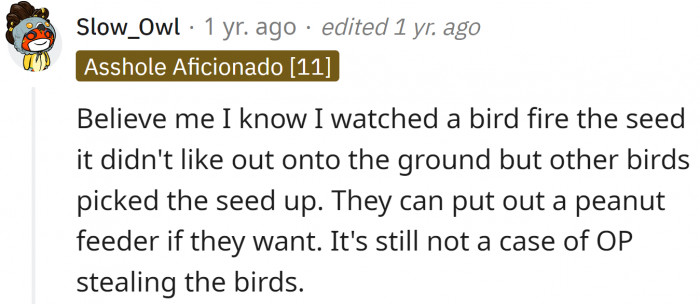
Blue jays, chickadees, and sparrows
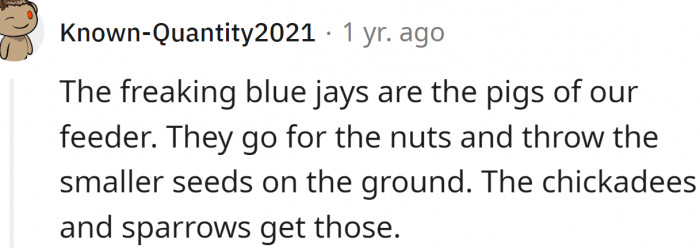
Stray peanut shells...
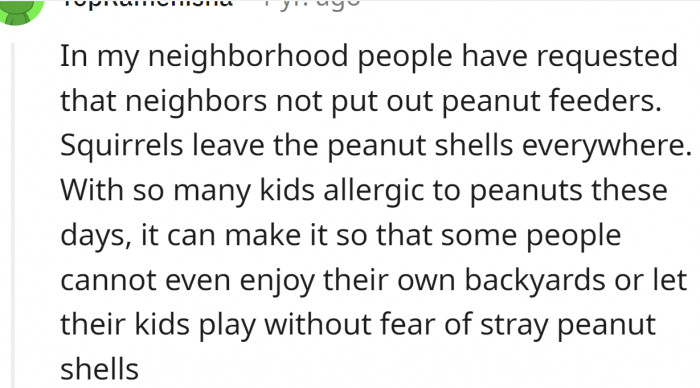
From a behavioral perspective, reinforcing positive actions through community feedback can enhance well-being and reduce guilt. Research suggests that when individuals receive affirmation for their environmentally friendly behaviors, it encourages continued participation. This is often seen in community-based conservation projects where shared success can motivate individuals to sustain their efforts.
Therefore, fostering a dialogue with neighbors about wildlife attractions can transform potential conflicts into collaborative efforts, enriching both community ties and the local ecosystem.
This Redditor shared their experiences:

It is nice to have options:
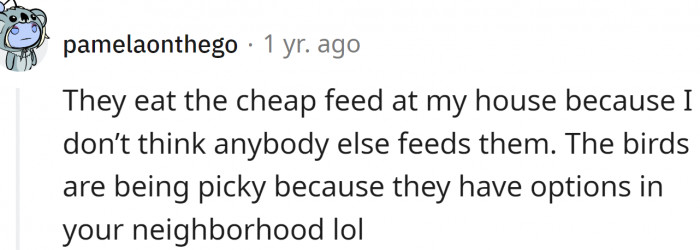
Some birds are picky eaters

Seeds birds like disappear within a day...

There is nothing better than:

Maybe OP should put a sign asking the birds to split their time evenly between gardens?

This Redditor says:
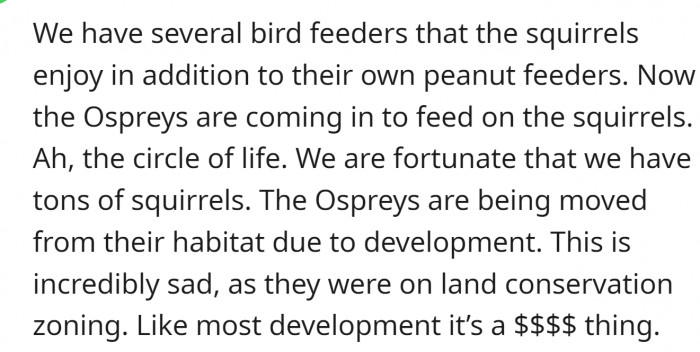
Birds go where the goodies are...

Bird feeders can be disease vectors.

Neighbors can complain about the weirdest things, from the smallest infractions to the most outrageous behavior. From barking dogs to loud music, from people leaving garbage in the street to bright lights shining in windows, neighbors can be quick to take offense and report what they view as a disturbance.
Sometimes, the complaints can be so unusual that they seem laughable. For instance, a neighbor might complain about a family having a barbecue in their backyard, or a resident might complain about someone mowing their lawn at an inappropriate time of day.
Other strange complaints might include things like a neighbor's garden being too wild or someone's children playing in the street. In some cases, neighbors might even complain about the color of a person's paint job on their house.
But this complaint tops them all...
Psychological Analysis
This situation reflects a common psychological struggle between individual desires and social norms. The feelings of guilt associated with the perceived 'stealing' of birds highlight an internal conflict between personal fulfillment and communal expectations. Understanding these dynamics can help individuals reconcile their actions with their values, fostering a more harmonious relationship with both nature and their neighbors.
Analysis generated by AI
Analysis & Alternative Approaches
Engaging in wildlife-friendly activities can not only enhance personal well-being but also strengthen community bonds. According to the American Psychological Association, fostering connections with nature and community is vital for psychological health. By creating spaces for dialogue and mutual involvement, individuals can navigate conflicts while promoting a shared commitment to the environment.



